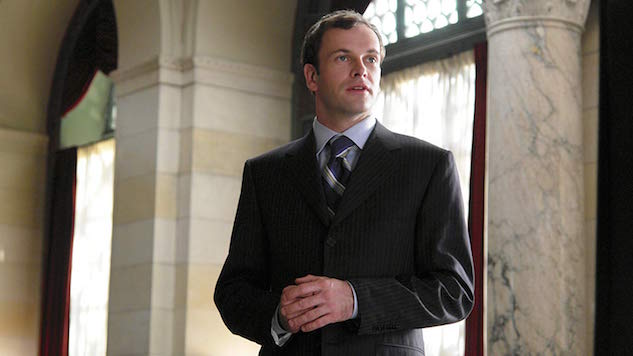ICYMI: How Eli Stone‘s First Season Made a Case for Having Faith in Network TV
Photo Courtesy of ABC
From the moment the first promo for NBC’s new jukebox musical-drama series Zoey’s Extraordinary Playlist dropped, the door officially swung wide open for people to remember (and, in true ICYMI fashion, wonder if other people remembered) a series in an extremely similar vein: ABC’s Eli Stone. Premiering during the infamous 2007-2008 TV midseason, Eli Stone starred Jonny Lee Miller as its titular character, an ambitious rainmaker lawyer whose whole approach to life and his career changed when he suddenly started having fantastical and musical (and aneurysm-caused) hallucinations—ones that may have actually been visions from the almighty up above. Perhaps the most memorable part of the series and Eli’s visions (though Eli and other characters question that possibility, the story itself was quite firm in its belief that Eli was, in fact, a prophet of the Lord) was the George Michael of it all. You see, not only was every episode of the series named after a George Michael song, the impetus of Eli’s visions (and a good number of them, especially in the form of the musical-based ones) came from a hallucination of George Michael performing “Faith” for an audience of one Eli Stone.
Going back to the comparison between Eli Stone and Zoey’s Extraordinary Playlist: While the latter notably hasn’t hitched its wagon to one musician specifically, the obvious light-hearted jukebox musical-drama setup brings forth comparisons. Especially with the case of the cast singing all of the songs themselves, which wasn’t the case for Netflix’s one-blink-and-you’ll-miss-it series, Soundtrack, where actors would lipsync the original recordings of its song choices. Unlike Glee or Crazy Ex-Girlfriend, neither of these series are musicals first, though Zoey’s is perhaps more concerned with the musical aspect than Eli Stone ultimately was. Plus, there’s the fact that Zoey’s musical condition seems to be the result of technological mumbo jumbo—a CT scan merging with a literal music playlist—which gives her the ability to read people’s minds through song. Stone’s condition manifests itself in both musical moments and fantastical imagery (like his world turning into World War II, or the beach, or a dragon following him) and is, in fact, in favor of a higher power. While both series are earnest interpretations of a specific genre, dedicated to having a little heart in a world that’s forgotten it, Eli Stone was also clearly dedicated to a much larger-than-life concept.
When Eli Stone began, Eli “had it all.” He had a great career at prestigious San Francisco law firm Wethersby, Posner & Klein; an also-great fiancée in Taylor Wethersby (Natasha Henstridge), daughter of his mentor and boss, Jordan Wethersby (Victor Garber); a company car that he dorkily called his “Millennium Falcon.” He had status. But he also had a strong relationship with his older brother Dr. Nathan “Nate” Stone (Matt Letscher), and together they had a bond over their resentment of their late, alcoholic father Jeremy Stone (Tom Cavanagh). But then, Eli “heard the music.”
-

-

-

-

-

-

-

-

-

-

-

-

-

-

-

-

-

-

-

-

-

-

-

-

-

-

-

-

-

-

-

-

-

-

-

-

-

-

-

-








































